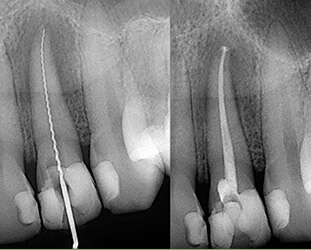
Nonsurgical Root Canals - Huntsville, AL
Expert Procedures Performed with Ease
 What Is An Endodontist?
What Is An Endodontist?
Endodontists are dentists who specialize in treatments for the inner parts of teeth, specifically root canal therapy. After completing undergraduate studies and earning a doctoral degree in dentistry, an additional two to three years of endodontic study is required. This advanced education and hands on training allows an endodontist to perform even the most advanced endodontic procedures.
 What Is A Root Canal?
What Is A Root Canal?
The innermost layer of a tooth is called the pulp. As primary and adult teeth are formed, the blood vessels and nerves that later become the pulp forms the tooth, connect it to the rest of the body, and form the center of a healthy tooth. When trauma or infection reaches this inner layer of the tooth, the result is a severe toothache. Advanced decay, severe facial trauma, untreated cracks and chips, or failed dental restorations can all lead to a need for root canal therapy. This treatment is used to prevent the loss of the entire dental structure that may occur. Instead, we remove the damaged inner pulp layer of the tooth to relieve toothache pain and remove damaged structure. Then, we refill the tooth with a filling material known as gutta percha and refer you to your general dentist for the permanent restoration.
Contact Dr. Deborah Bishop right away if you experience any of the following indicators that root canal therapy may be necessary:
- Severe toothache
- Sharp pain when biting or chewing
- Lingering sensitivity to changes in temperature
- Discoloration of the tooth
- Swelling, sores, or inflammation in the gum tissue around a specific tooth
 Are Root Canals Painful?
Are Root Canals Painful?
We use local anesthesia to numb the area around the tooth, making root canal treatment very comfortable. Following treatment, you may experience minimal discomfort. However, this can typically be abated with the use of over the counter pain relievers such as Advil Liquid Gel (ibuprofen) or Tylenol Rapid Release (acetaminophen).
 How Do Microscopes Help?
How Do Microscopes Help?
A tooth is quite small, and endodontic work is focused on the tiny inner structures of teeth. There are numerous, narrow branches and paths inside the tooth, and in order to navigate these, we use microscopes. These specially crafted operating microscopes allow Dr. Bishop to have a detailed view of the interior part of the tooth while she performs even the most advanced forms of endodontic care. As the first endodontist in the state to use surgical microscopes during endodontic treatment, Dr. Bishop is proud of the high quality work she performs through experience. In addition to magnifying the dental structures, surgical microscope also provide superior illumination of these inner tooth structures. Dr. Bishop is able to clearly see the inside of the tooth in detail, and she offers precise, conservative care. We can also capture high resolution digital images of the magnified dental structures. These can be shared with patients and your general dentist for improved communication and treatment planning.
 What Will Happen to My Tooth After Root Canal Therapy?
What Will Happen to My Tooth After Root Canal Therapy?
Following root canal therapy, you will return to your general dental office where a permanent filling or a dental crown will be placed. Dr. Bishop will communicate with your dentist to share all of the pertinent information about your treatment including procedure notes and digital images. We will do whatever we can to ensure the longevity of your root canal procedure in partnership with your general dentist.
 Why Should I Not Use Antibiotics to Make The Abscess Go Away?
Why Should I Not Use Antibiotics to Make The Abscess Go Away?
When a tooth is infected, the blood supply (pulp) running through the tooth is affected as well. As a result, there is no way to conduct the antibiotics to the needed area. They do however, assist in controlling and eliminating infection in the surrounding bone before and after root canal therapy.
 Will My Tooth Last Forever After Treatment?
Will My Tooth Last Forever After Treatment?
In as much as 95% of root canal procedures, patients report experiencing complete success, keeping the treated tooth for their lifetime. Dr. Bishop uses the highest quality materials and the most advanced techniques and technologies to ensure patients have every opportunity to retain their root canal treated tooth.
 What Should I Expect After Treatment?
What Should I Expect After Treatment?
Inflammation is the body’s way of healing. If you have ever had a bug bite, cut, or bruise, you have likely observed swelling and redness as a result. This is inflammation. It is no surprise that, after undergoing root canal therapy, you may experience some inflammation as the body undergoes the healing process. If you experience severe discomfort or continued discomfort beyond 10 days after your treatment, please contact Dr. Bishop right away.
 How Do I Know I Need Root Canal Therapy?
How Do I Know I Need Root Canal Therapy?
You won’t know for sure that you need a root canal until we’ve examined your mouth, but there are some telltale signs you can watch out for. For example, persistent tooth pain is usually a key indicator that there’s an infection. Also, if the tooth has recently become discolored or is now sensitive to heat and cold, that is usually a good indicator that something is wrong. Keep an eye out for swollen gums and take notice if your tooth becomes mobile to any degree.
 Root Canal FAQs
Root Canal FAQs
Root canal therapy tends to get a bad reputation, but many people don’t realize that the treatment is actually designed to provide an alternative to a much worse scenario: extraction of your tooth. Dr. Bishop is happy to answer all of your questions ahead of your treatment and make sure you’re feeling 100% comfortable before beginning your root canal therapy. You’re also welcome to read about the most common questions our office receives regarding the procedure below.
Are root canals common?
Root canals are a very common procedure performed by endodontists all over the United States and the world. In fact, roughly 15 million root canals are completed in the U.S. alone. That means the average endodontist will perform about 25 root canals every week. That’s a lot of teeth saved from extraction! This should help give you additional confidence in your future treatment, especially with Dr. Bishop’s well-trained hands and attention to detail.
Is root canal therapy safe?
On top of being extremely common, root canal therapy is deemed one of the safest and most successful dental procedures performed today. Success rates range from 86% to 98% according to the European Journal of Dentistry. This is in large part due to the high level of predictability that comes with the treatment. Once the bacteria is eliminated from your tooth root, your inner tooth can finally begin the healing process and achieve its full function.
Do I need to take off work after root canal therapy?
This really depends on what you do for work. For example, if you work a basic office job where you’re sitting most of the day, you probably won’t have to take any days off if you schedule your root canal therapy ahead of the weekend. In many cases, patients can expect to recover from their root canal after a few days of rest. However, if your job entails large amounts of strenuous labor, then you may want to take at least one day off from work. Strenuous activity can negatively affect your body’s ability to heal.
Can I eat after a root canal?
You should wait at least 45 minutes before eating after having a root canal. This gives your temporary filling enough time to fully harden. With that said, it’s best to wait until your local anesthetic wears off completely before chewing so you don’t accidentally bite on your lip, cheeks, or tongue without realizing it.
Does insurance cover my root canal therapy?
In most cases, dental insurance will cover at least a portion of your root canal. However, plans can vary dramatically in terms of their coverage, ranging from 50% to 70% depending on the plan and the provider. Our office is in-network with many Aetna and Cigna plans and we will gladly file insurance claims as a courtesy to our patients. If you have questions or need guidance on how to best finance your future care, please let us know and our team will help however they can.